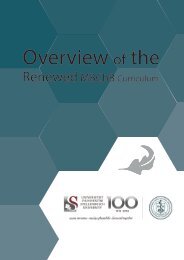ebook
Create successful ePaper yourself
Turn your PDF publications into a flip-book with our unique Google optimized e-Paper software.
Dysfunction<br />
Module co-leads: Hans Strijdom (jgstr@sun.ac.za)<br />
Year 2 Semester 2<br />
Danny de Wet (drdewet@sun.ac.za)<br />
‘abnormality or impairment in the operation of a specified bodily<br />
organ or system’<br />
In the Dysfunction Module, the student will gain an understanding of the<br />
underlying causes, factors and mechanisms that lead to a transition from normal<br />
(functional) to abnormal (dysfunctional).<br />
The majority of the module content will focus on the patient (in a systems<br />
based approach), although the community, health system and self pillars will also<br />
enjoy a critical presence in the module.<br />
PATIENT<br />
COMMUNITY<br />
HEALTH<br />
SYSTEM<br />
THE SELF<br />
Outcomes:<br />
Identify and describe<br />
mechanisms<br />
underlying<br />
dysfunction and<br />
disease.<br />
Explain how the above-mentioned<br />
mechanisms translate to<br />
dysfunction and common disease<br />
entities, as well as specific<br />
conditions affecting the child and<br />
adolescent, woman and newborn,<br />
man and elderly patient.<br />
Analyze<br />
community-related<br />
factors contributing<br />
to dysfunction and<br />
disease.<br />
Evaluate the<br />
impact of the<br />
health system on<br />
dysfunction and<br />
disease.<br />
CLINICAL CURIOSITY<br />
Identify and recognize strengths and<br />
weaknesses of different research designs,<br />
focusing on qualitative studies (in the<br />
context of patients' experience of<br />
dysfunction).<br />
Reflect on personal<br />
health and wellbeing by<br />
focusing on factors that<br />
may result in<br />
dysfunction and disease<br />
of the self.<br />
LONGITUDINAL PRIMARY HEALTH CARE EXPERIENCE<br />
To facilitate a smooth transition<br />
to the next Module<br />
(Medical Detective),<br />
the student will learn how<br />
underlying pathological<br />
mechanisms translate into<br />
symptoms and signs observed in<br />
specific diseases and disease<br />
conditions.




